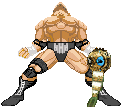
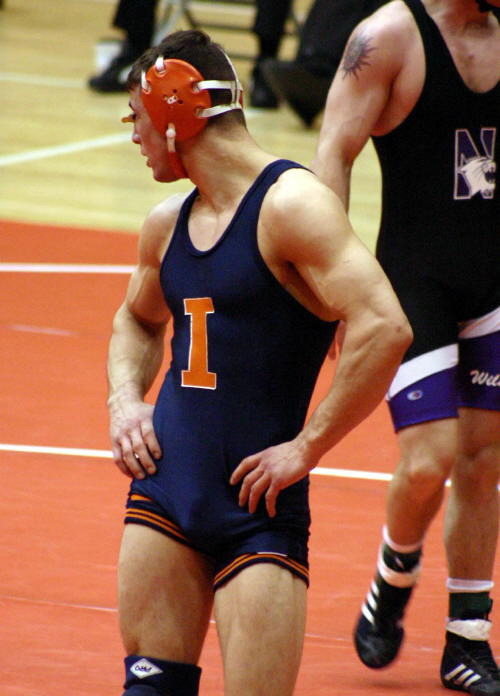

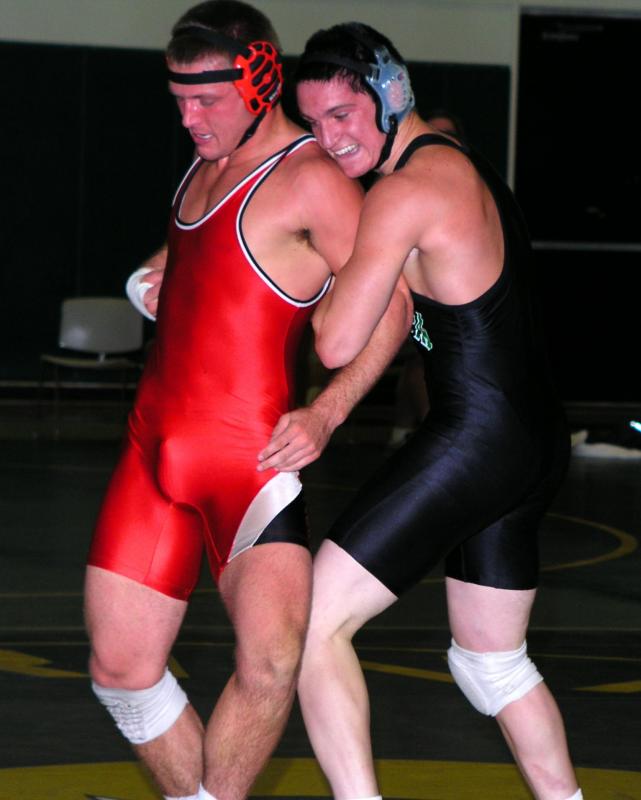
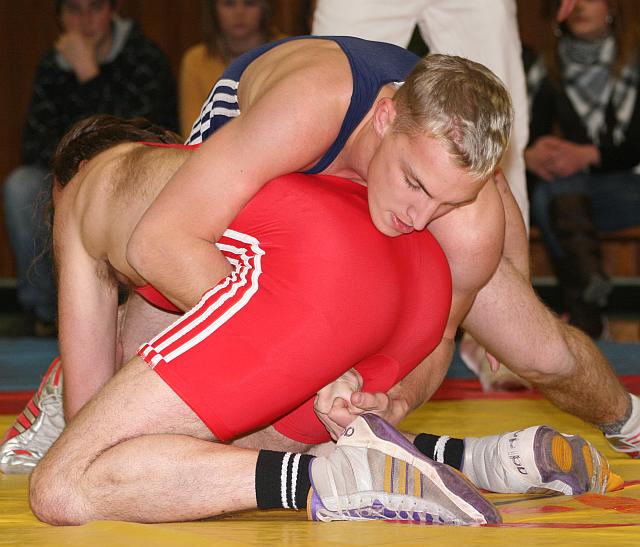
:cheers: I was not familiar with this form of Wresting before your post!!! :cheers:
Hot men and I always love the competition involved for "Top Man" :thx:
I do not have the access to all the information I need to really help you figure out this situation but I can tell you some things that I do see from your profile.
You have only 5.191 Seed Bonus Points ~ these points are awarded at the rate of .5 points per hour of active seeding time and have nothing to do with actual uploaded amount. They are awarded for simply trying to seed your downloads. your points indicate just over 10 hours of actual seeding time since you joined some 75 weeks ago. You will never reach minimum ratio at this rate of seeding time. You should have all your downloads available to seed and your torrent client open 24/7 if you are to ever get out of this situation.
This is easily accomplished as long as you can seed 24/7 but you must spend more time seeding period. You will gain Seed Bonus Points for the time seeding and if a leecher for one of your downloads comes online you will at least be connected to be able to gain actual upload amount.
The only other solutions are to upload new content or Donate to the site for the upload amount you need. You say you can't upload but do not explain what you mean by "can't". Our Upload System is dead easy to use even if you need some initial help with the process. If the problem is you do not have any new content then this is another kind of problem but sometimes you can work around this with some creativity on your part.
As I said I am not able to see all your account details so there could other issues as well and a Glo-Mod will have to help with those issues. However, you really must increase your seeding time ASAP!!.
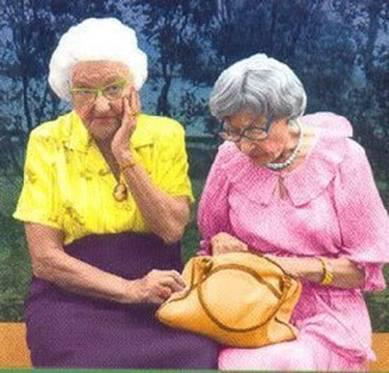
SYLVIA: Hi! Wanda.
WANDA: Hi! Sylvia.
How'd you die?
SYLVIA: I froze to death.
WANDA: How horrible!
SYLVIA: It wasn't so bad. After I quit shaking from the cold, I began to get warm & sleepy, and finally died a peaceful death.
What about you?
WANDA: I died of a massive heart attack. I suspected that my husband was cheating, so I came home early to catch him in the act. But instead, I found him all by himself in the den watching TV.
SYLVIA: So, what happened?
WANDA: I was so sure there was another woman there somewhere that I started running all over the house looking.
I ran up into the attic and searched, and down into the basement. Then I went through every closet and checked under all the beds.
I kept this up until I had looked everywhere, and finally I became so exhausted that I just keeled over with a heart attack and died.
SYLVIA: Too bad you didn't look in the freezer – we'd both still be alive.
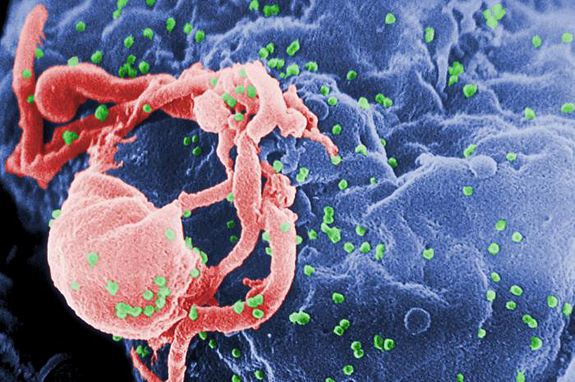
The human immunodeficiency virus (HIV, in green), infecting a cell. Image taken with an electron scanning microscope.
Yahoo News ~ By Rachael Rettner, Senior Writer
NEW YORK CITY — More than 30 years after the discovery of the AIDS virus, experts are optimistic that a cure for the disease will be found, and that an end to the AIDS epidemic is possible.
But they caution there is still a lot of work to be done.
Since the first cases of AIDS were reported in 1981, more than 25 million people worldwide have died of AIDS. There are currently 33 million people living with AIDS, including 1 million in the United States. There are 50,000 new infections in the United States each year.
Three methods that are being explored to end the AIDS epidemic are drugs, vaccines and gene therapy.
There are already drugs that can prevent AIDS, which is caused by the human immunodeficiency virus (HIV). Recent research has shown that taking antiretroviral drugs not only reduces the amount of HIV in the body, it can also stop transmission of the virus. People at high risk for contracting HIV can now take a daily pill to prevent infection, Dr. Robert Grant, an HIV researcher at the Gladstone Institute of Virology and Immunology, said here Friday (May 31) at a panel at the World Science Festival.
But others say these drugs will not be enough to stop AIDS spread.
"We've got to find a way to immunize people, so that they don't have to take an action to protect themselves," said David Baltimore, a noble prize winner and professor of biology at the California Institute of Technology, who also spoke on the panel. "That's how public health works." [Watch the World Science Festival Live]
In 1984, Margaret Heckler, the Secretary of Health and Human Services at the time, said that a vaccine against HIV was expected within two years. But today, no vaccine exists, and most trials testing HIV vaccines have failed to show any benefit.
The reason making an HIV vaccine is so difficult is because the virus has already found a way around the body's defense — it is able to invade immune cells, the very cells that are supposed to attack it.
But recently, researchers have devised new ways of creating HIV vaccines.
One method uses stem cells that are engineered to develop into immune cells that lack the port of entry for the HIV virus. Without this port, or receptor, HIV can't get inside to thwart the immune system's attack.
Another approach is to use gene therapy to get the body to make special immune cells, called broadly neutralizing antibodies, which are capable of preventing HIV infection. Most people don't make these antibodies in response to HIV. But the gene therapy gives cells the genetic material they need to make the antibodies.
Both the stem cell and gene therapy methods were invented by Baltimore and colleagues. Baltimore said he hopes to start a trial for the stem cell therapy next month, and one for the gene therapy within a year.
Experts point out that even when a trial fails, researchers can still learn something. "It's only through failure that you get to success," Grant said.
Peter Staley, an AIDS activist, said he expects a cure within his lifetime, perhaps within the next 15 years. "Everybody thinks it can be done, it's just a matter of time and effort," Staley said.
You should also post some of these models in this Forum for members to perv :ok2:
Tech2.com | Posted on Jun 02, 2013 at 05:37pm IST
Mumbai: Are browsers really just used to surf the net anymore? They're used now to access web apps, have deep social network integration and more. So, while the browser's functionalities have changed, how can the design remain stagnant?
Mozilla is first in line to embrace change. "Maybe we shouldn't even call it a browser anymore," Jonathan Nightingale, Mozilla's Vice-President of Firefox Engineering told TechCrunch. "'Browser' is really an antiquated word. People don't really browse all that much anymore."
Mozilla has been working on a project called Australis, named after a star system, the company's version of what the future of modern browsing could look like. You can expect to find parts of this product incorporated into Firefox release channels, starting with Nightly, as soon as it hits version 25. Australis will also make its way to the web through the usual release channels thereafter.
Looking suspiciously similar to Chrome, tabs in Australis are more rounded than in Google's version of the browser. The search bar, download, home and menu button then are pretty much what they look like in Firefox currently. The cleaner, "more intuitive" design of the browser is part of what Nightingale says is a capable, yet simple browser.
Simplicity of design and customisation are the key points as far as Australis is concerned. The design makes sure that tabs and icons are non-intrusive while you're surfing the internet. Unlike Chrome, tabs not in use currently will blend away into the background till you decide you need the again. Firefox will even move to a scrolling bar once you've reached the minimum width of tabs.
To read more visit: hXXp://www.tech2.com
![]()
21 Things You Probably Never Knew About LGBT Pride
Do you know what each color of the rainbow flag represents? Did you know that the Stonewall Inn was owned by the Mob at the time of the revolutionary riots in 1969?
In honor of Pride Month, which kicked off on June 1, we've scoured the history books to bring you 21 facts about LGBT Pride and the LGBT community that you may not already know about.
So get clicking and get schooled! Happy Pride!
Slideshow : hXXp://www.huffingtonpost.com/2013/06/02/gay-pride-2013-21-facts_n_3368618.html?ref=topbar
Huffpost Gay Voices ~ Michael Bullock
"All characters appearing in this work are fictitious. Any resemblance to real persons, living or dead is purely coincidental."
This is the standard phrase that most publishers use to protect themselves against lawsuits. For my book Roman Catholic Jacuzzi, a story recounting my accidental discovery of a retreat for closeted gay Catholic priests, Brendan Dugan, owner of independent book publisher Karma (a name that could not be a better match), decided that it was important to do the exact opposite, proudly proclaiming "a true story" on the cover. Since the book launch last month, that is the question I'm asked the most: "Is it really true?" I explain that the only embellishment is in my in portrayal of the priests as both more attractive and more likeable than they were in reality.
In October 2010 I discovered the secret retreat where these priests meet in private once a year to let their hair down and be openly gay together for the week. I was not on a mission to find and expose such a retreat; I booked a cabin with the aim of being alone to concentrate on writing, and it happened to be at the same place and time as the priests. The disorganized resort allowed my stay without realizing what else they were hosting. As a gay former Catholic altar boy, I could not believe both the luck and horror of this discovery: Here I was, in the heart of the hypocrisy of the Catholic Church, face to face with gay men whose teachings give a moral backbone to homophobia and discrimination against their fellow gay and lesbian brothers and sisters, men who uphold a value system that made me feel terrible as a teenager and made the process of admitting to myself that I'm gay torture because of its unbearable moral dilemma: Repress your sexuality or be damned! I immediately knew how politically important this retreat was and wrote down my experience with the priests as it was happening. Roman Catholic Jacuzzi is the document of my weekend with these men, which resumed in their disco-drag party, during which I witnessed the hilarious irony of watching gay priests freak out on the dance floor to every Lady Gaga and Madonna hit, including "Like a Prayer."
At the time, I could not imagine all the major steps that the world would soon take, culturally and politically, toward gay rights and acceptance. Since then, Pope Benedict XVI has resigned amid unresolved scandals (with the Vatican's own internal investigation uncovering alleged blackmail from gay prostitutes); it has become common knowledge that the Vatican owns the biggest gay bathhouse in Rome; journalist Andrew Sullivan stated on MSNBC that he believes that many Catholic cardinals are gay (with few repercussions); Dan Savage's "It Gets Better" campaign has caught fire; and Anderson Cooper and Jason Collins have come out – all of this leading up to next month's historic Supreme Court rulings on the two most important gay civil rights cases of our lifetime, with public support in the majority, at 53 percent. Despite these developments, the Vatican clings to its stance against gay rights. Before Pope Benedict XVI resigned, he intensified his rhetoric, describing gay marriage as a threat to peace and denouncing those who he claims reject their God-given gender identities, arguing that their actions are destroying the "essence of the human creature." Before becoming pope, Pope Francis echoed these remarks, calling gay marriage "an anthropological step backward." It will be heartbreaking if this closeted gay mafia's influence sways the Supreme Court's decisions.
Roman Catholic Jacuzzi could have easily been used to publicly chastise gay priests as hypocrites, but as I witnessed firsthand the painful lives that these conflicted men lead, my position transformed from utter disdain to compassion. The gay priests I met told me that they estimated that the majority of their peers were gay. The gay men who are attracted to the priesthood are those who were brought up in the homophobic culture of the church. The church is both their problem and their solution, offering a respected position with the added value of a vow of celibacy that creates a seemingly perfect closet -- that is, until your unfulfilled urges get the best of you and preaching against what you are clouds your consciousness. A friend who read Roman Catholic Jacuzzi pointed out that the book ironically makes me an extremely unlikely advocate for this unregarded but important disenfranchised minority. I hope so. Openly exploring their plight seems like a path that could possibly lead to real, enduring change. This past Easter morning, Cardinal Timothy Dolan of New York said that he would like to be more welcoming to gay and lesbians. It might do him well to start with his colleagues and open a real debate about the church's closeted gay staff. In the 1970s Harvey Milk famously preached that coming out is the central action to advance gay civil rights. I would like to build on that and invite all gay Catholic priests to be brave enough to join the movement. Their honest sexual freedom is key to ending homophobia and ushering in a new worldwide era of gay equality in which the Catholic Church has an opportunity to reinvent its position and play a new role that truly teaches love instead of hate.
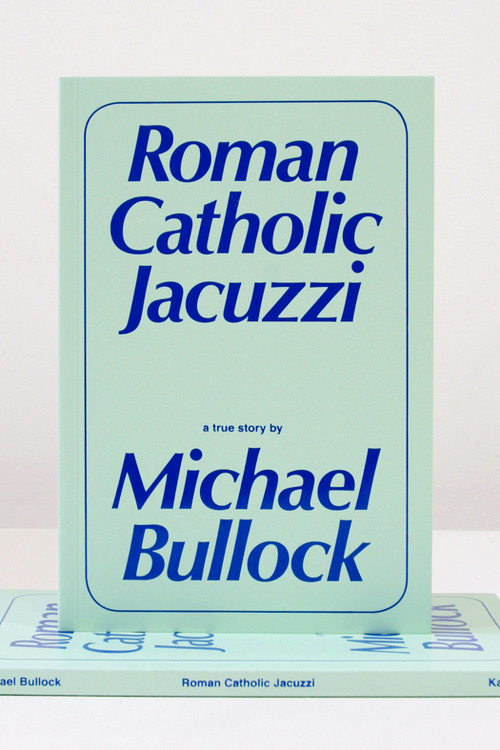
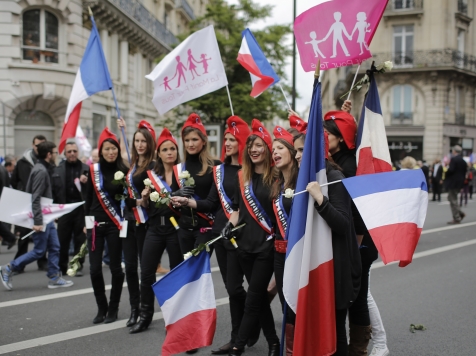
BreitBart ~ by Dr. Susan Berry
Though many Americans have long considered France to be the epitome of liberal social attitudes, in no other country has the world seen the magnitude of a movement whose cause it is to defend traditional marriage and family.
Philip Lawler, Editor of Catholic World News, sounded envious on Tuesday:
Today, watching from this side of the Atlantic as hundreds of thousands of French citizens march in defense of marriage, I can't help thinking that now they are building a movement, the like of which we haven't seen here in the US. I don't mean to denigrate the efforts of many good people who have fought every political battle. I realize that there have been rallies and marches and demonstrations. But to march the scale of the protests in Paris, we'd need to see 4-5 million people gathered in Washington to defend marriage—not once but repeatedly!
But why are so many French men and women coming together in this cause? After all, the French government has already legalized same-sex marriage, and, as social issues go, the French have been fairly resigned to others, such as legal abortion.
Lawler states he doesn’t know why, but only hopes “Christian Americans will be inspired by their example.”
Ludovine de la Rochère, president of La Manif Pour Tous, the movement opposed to France’s recently enacted same-sex marriage law, delivered a speech at a mass rally on May 26th- France’s Mother’s Day- before hundreds of thousands of advocates. She told her supporters:
We are several million who have marched peacefully over the course of the long winter months against the new law, against artificial insemination, against surrogacy for all, against homophobia. We have neither broken a window, not one, nor set fire to a single car. Nothing of the sort!
We are neither a political movement, nor a faith-based movement, nor a coalition of hateful homophobes. Our adversaries have tried everything to paint us in such a way. But they have failed, because one cannot deny that our cause is open to all who worry about the rights and well-being of children. We are people who are but mindful of the interest, the balance, and the happiness of the family.
According to de la Rochère, the traditional marriage movement has taken hold in her country “because our fundamental and universal values unite us.”
Determined that those “fundamental and universal values” focus on the “well-being of children,” de la Rochère has turned her movement into the multitude that it has become.
The activist explained:
The truth is that we do not have the same notion of equality as our opponents do. Our belief, held by most of the country, rests first on the equality of children, equality before the right to have a father and mother, that is to say, an origin and real heritage, rather than a false heritage. Based on that we have come together as atheists, Christians, Jews, Muslims, right, left, straight, gay. For all, the truth that we owe to the child is sacred. We do not want children’s lives to be woven around lies, nor do we want gender studies ideology to triumph.
“France has awoken!” de la Rochère exclaimed to the crowd, noting that her movement has history on its side. “All the generations are here and among them, fathers and mothers and youths, each one keeping watch over us, over all of France, in silence, peaceful.”
The activist asserted that, despite the mocking and libelous comments of the left, the huge gathering of those who value traditional marriage and family will win out in the end. Underscoring the magnitude of her movement, de la Rochère said:
We have carried out a historic mobilization. The Manif pour Tous is the biggest social movement that France has known since May 1968. Let us take stock of what we have accomplished: We are a social force, we are powerful and determined and organized. This success is owed principally to three causes: our lack of self-interest (for we are thinking of future generations), our concern to protect the weakest among us, our respect for the other.
“Tomorrow will never be the same,” de la Rochère triumphantly announced, despite the apparent targeting and harassment of her movement by the government and its agencies.
“We have protested while respecting the laws of the Republic; they have reacted as the apparatchiks of a totalitarian state, and I choose my words carefully,” de la Rochère said.
She then asked a question, a version of which Americans have heard recently: “Are we still living in a true democracy?” seemed to echo Rep. Kevin Brady’s (R-TX) question of IRS commissioner Steven Miller: “Is this still America?”
Remaining focused on the needs of children, de la Rochère challenged the commonplace “equality” argument in favor of same sex marriage by turning it upside down.
“Their mouths overflow with the words ‘equality of man and woman.’ She said. “But why should marriage not be a place of equality, too, so that a child will be raised by man and woman? What a strange idea!”
“These are dangerous times,” de la Rochère admitted, but, undaunted, she called to those outside of France who understand the seriousness of the cause of children.
“This is a question of humanity, its future, the future of man and woman, our children, and their freedoms,” she affirmed. “Our task is huge, but it is essential. We are numerous in France and in foreign lands too. The whole world watches us, because once again the French have dared to rise up against the tyranny of a minority and its colluders.”
First Things has the full text of de la Rochère’s speech.
Huffpost Gay Voices ~ Edwin & Robert
As thousands protested the recent legalization of gay marriage in France – and the U.S. Supreme Court gets ready to weigh in on the issue in June -- HuffPost's "International Spotlight" presents the views of three gay couples, all raising children, in France, the U.S. and also Canada, where gay marriage has been legal for eight years. You can read the U.S. entry here. Tomorrow: Canada.
We think that like for most parents, our most important objective is to provide a safe and secure environment in which our children can develop their personality and interests. Children who feel safe and loved emerge confident and ready to try new things and to take on new challenges.
When we first met, Edwin had already spoken of his desire to have children, but as we both came from very conservative families, we couldn't imagine the kind of environment in which a child with two gay dads could thrive and feel supported by the community in which we live.
Fast forward 17 years, and we found ourselves announcing that we were expecting twins to our friends, family and colleagues, but also to the city hall, the child care center and, later, to the preschool. Nothing could be more normal, and yet... We received mixed responses from friends, ranging from "What you are doing is the most beautiful thing in the world" to "You already have careers and each other; why do you need children as well?" In our contact with public services, however, we were uniformly treated with professionalism and respect, even though in most cases we were told that we were the first openly gay family to contact them.
We live in the center of Paris, and didn't realize how lucky we were to be in a diverse and accepting environment. Robert is a member of the Parent Teacher Association [conseil d'école], and our children have faced almost no overt incidents of homophobia. One time while on summer vacation, a little boy of about 5 send to our daughter, "It's not good to have two dads!" Our daughter replied with a scornful, "It's great! What do you know about having two dads?" Chastened, the other couldn't think of a reply and just slunk away.
We know, however, that this is only the beginning. Our twins are in first grade, and as they get older there will be more pressure to conform to the societal norm. Already we are concerned about the climate of rough play and fighting our children tell us about on the playground. Kids can be cruel, and will look for any difference – weight, height, ethnicity -- as an excuse to pick on or bully other children. Our job, therefore is to arm them with confidence and a sense of self to respond to these attacks.
On 17 May, the International Day Against Homophobia, our son asked us, "What is homophobia?" This was an opportunity to have our first conversation with our kids about how to respond to homophobic taunts. They had trouble understanding at first what was wrong with having two dads. "It's great," they told us, but my daughter added: "Sometimes when I try to explain my family to the other kids, they don't always understand." We asked her, "But do you understand?" "Yes!" she replied.
Their teachers have told us that, from a very young age, they had the clearest idea in their class of who the members of their family were: e.g. maternal grandparents; paternal grandparents on daddy's side; paternal grandparents on papa's side. We have always told them how they were born and where they come from, as we feel that this is not only their right, but also helps them to feel grounded and secure. Of course, we use language adapted to their age: "Your daddy and our friend, Marelle, each gave a little seed that we put into the belly of our surrogate, Girlie. Girlie carried for you for nine months so that Daddy and Papa could take care of you when you were born."
Acceptance extends beyond mere tolerance, and on this measure we have felt very lucky. A small group of parents meets in a local bar for a coffee every morning after dropping off the kids at school. When a few of the other parents asked us if we'd like to march with them and their families on November 19, 2012 -- at the demonstration in favor of the government's bill on same-sex marriage -- we realized that we live in a community of families with like-minded values. Right now, this is the most important thing for us.
While we have welcomed the law on marriage for same-sex couples, we were chastened by the huge turnout in France against marriage equality, and puzzled and saddened at how extending equal rights could motivate people to take to the streets against families like ours. Most important, we wondered if the visibility of the 'Manif pour Tous' wasn't providing license for a new wave of homophobia in the guise of protecting family values. Looking at all of those self-satisfied families marching to deprive our family of equal rights, we wondered if they knew how scary they seemed to us and how much more of a real threat they were to our family than we were an (imagined) threat to theirs. We wondered if they had actually taken the time to talk to and understand the gay families that they seek to demonize. Finally, we wondered what things they said to their children at home, that could one day be repeated to our own children in the school yard.
UNESCO presented a report last year on homophobic bullying which shows the detrimental effect that bullying can have on children's morale, ability to learn and sense of self-worth. We have heard of fundamentalist evangelicals in the U.S. who are against anti-bullying initiatives as they feel that they weaken social control in order to make homosexuality more acceptable. The fact that effeminate boys, masculine girls or those from non-traditional families are terrorized and ostracised does not seem to be of any concern to them. When a show of force is used to impress, intimidate and prevent people from doing the right thing, it sounds a lot like bullying and a lot like the 'Manif pour Tous'. When parents try to make their children feel loved and accepted, it sounds a lot like a family -- gay or straight.
Edwin is an American who has lived in France for 13 years. Robert is a French civil servant. They have been together for 24 years and have 7-year-old twins, born through surrogacy in the United States. The children call Edwin "Daddy" and Robert "Papa."
Translated from the original French.
The New York Times ~ By TARA SIEGEL BERNARD
Now that Delaware and Minnesota have legalized gay marriage, there are 12 states where same-sex couples can marry. And in the next few weeks, the Supreme Court is expected to weigh in on a constitutional challenge to the Defense of Marriage Act, which defines marriage as between one man and one woman.
Given all of the momentum on gay rights in recent years, it’s easy to overlook the fact that gay workers lack a basic but crucial protection: there is still no federal law that explicitly protects employees from job discrimination on the basis of their sexual orientation or gender identity, which is the subject of this week’s Your Money column.
A patchwork of state and local laws, along with court and agency decisions, provides some protections. But gay rights advocates say what’s really needed is a federal law.
If you or someone you know was a victim of this type of discrimination, civil rights experts suggest reaching out to an advocacy organization, such as Lambda Legal, the National Center for Lesbian Rights, Gay & Lesbian Advocates & Defenders, or the American Civil Liberties Union. They can help assess the strength of your claim, and chart the best course of action based on where you live.
Have you been subject to this type of discrimination? How did you resolve the issue?